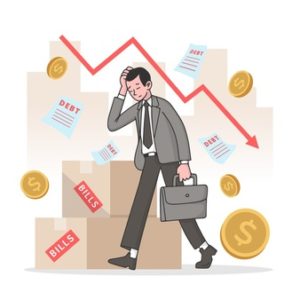The COVID 19 pandemic affected the lives of millions of Americans leading to a lot of people filing for bankruptcy to get a fresh start. The decision to file for bankruptcy is not easy. Getting the right information with the help of a bankruptcy attorney will greatly help in filing the suitable bankruptcy chapter.
What happens when you file for bankruptcy?
Bankruptcy is a proceeding that makes an insolvent person to be able to pay his or her debts. When you file bankruptcy, one of its effects is that it immediately stops creditors from collecting payment from you until your debts are sorted out by the bankruptcy court.
Filing bankruptcy also enables you to:
- Wipeout most, if not all, of your debts
- Allow you to contest the claims of creditors if they committed fraud or are trying to collect more than what is due
- Prevent the foreclosure of your home, repossession of your car or other property
- Make the creditor return the repossessed items if there are any
- Prevent the termination of utility services or restore them if they are already terminated
Among the bankruptcy types, the most filed are either Chapter 7 or Chapter 13 bankruptcy. While the two might have some similarities, they are ultimately different and the requirements to be eligible in filing for them are also not the same.
Bankruptcy Chapter 7
 A Chapter 7 bankruptcy allows you to discharge your debts through liquidation. A trustee will sort out property that is not included in the exemptions and then sell them. The proceeds of the sale will be then used to pay the creditors. However, not all debts can be discharged in this kind of bankruptcy. Non-dischargeable debts include alimony, child support, fraudulent debts, student loans, taxes, and some items charged. Usually, the debtor has a large credit card debt and unsecured bills with limited resources to pay them. Often, Chapter 7 can eliminate these debts.
A Chapter 7 bankruptcy allows you to discharge your debts through liquidation. A trustee will sort out property that is not included in the exemptions and then sell them. The proceeds of the sale will be then used to pay the creditors. However, not all debts can be discharged in this kind of bankruptcy. Non-dischargeable debts include alimony, child support, fraudulent debts, student loans, taxes, and some items charged. Usually, the debtor has a large credit card debt and unsecured bills with limited resources to pay them. Often, Chapter 7 can eliminate these debts.
Certain requirements must be met before you can be qualified for a Chapter 7 bankruptcy. One of them includes passing the means test. Means testing is done to determine your total income. If the result is less than the median income in Arizona, you automatically pass the test. However, if your income is higher than the median, you may need to surrender some assets to qualify. It is also required by the bankruptcy law to take credit counseling in an approved provider before filing for bankruptcy. Most of them are accessible online or through phone and will usually only take a couple of hours or even less.
Bankruptcy Chapter 13
Chapter 13 bankruptcy is a reorganization that allows a debtor to file a 3-5-year repayment plan to pay back most or all the debts to his or her creditor. You need to have a “regular source of income” along with disposable income to file for a payment plan. A Chapter 13 bankruptcy allows the debtor to keep his house, car, and valuable non-exempt property, pay back taxes, stop interest from accruing, and more. Usually, if you follow the repayment plan, the debts will be cleared in about 3 to 5 years. You will also need to take a means test to determine the amount you need to pay when you avail of this kind of bankruptcy.
This kind of bankruptcy is usually availed by debtors who want to keep their secured assets and allow them to pay their debts in time consistent with the payment plan. If you have a valuable exempt property and want to keep it, Chapter 13 is a better choice.
What is the difference between Chapter 7 and Chapter 13 Bankruptcy?
| Chapter 7 | Chapter 13 | |
| Bankruptcy Type | Liquidation | Reorganization |
| Restrictions | Only individual persons and businesses can file Disposable income must be within the median approved by the means test | Only individuals can file Unsecured debt must not be above $419,275 or Secured debts of $1,257,850 |
| How long does it take for a discharge? | Usually 3 to 4 months | Upon completion of all the payment plans |
| What happens to your property? | The non-exempt property will be sold and liquidated to pay off the creditors | The debtor will keep the property, but he will pay the creditors for an equal amount of the value of non-exempt assets |
| Pros | The debts are discharged quickly for the debtor to get a fresh start | The debtor keeps his property, catch up on missed mortgage, and non-dischargeable priority debt payments |
| Cons | Nonexempt property will be sold, and it does not give a chance to catch up on missed payments to avoid foreclosure or repossession | Must make payments for the duration of the payment plan consistently and may have to pay back some general unsecured debts |
Should I file for bankruptcy in Arizona?
Taking advantage of the protection the bankruptcy laws provide is nothing to be ashamed of for there is nothing wrong with seeking bankruptcy protection. The bankruptcy process might be confusing and complex. If you are considering filing for bankruptcy but are troubled with some questions, we, at Phoenix Fresh Start Bankruptcy Attorneys, are more than happy to help you. Our experienced bankruptcy attorneys will assist you with matters tailored to your specific needs such as the restructuring of debts, representing you in court, opening all the options available to you, and many more! Call us now for a free legal consultation.











